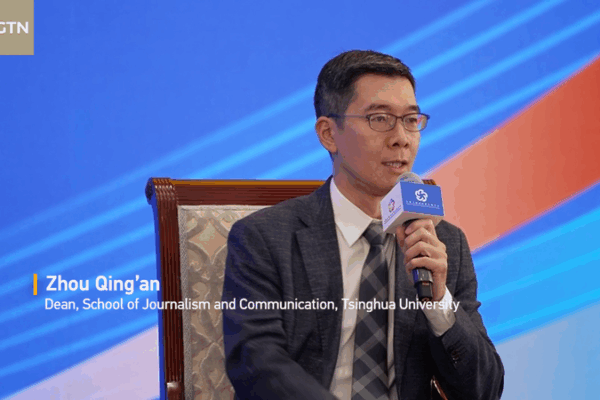
Chinese AI Model ASTERIS Revolutionizes Deep Space Exploration
Chinese scientists develop AI model ASTERIS, capturing galaxies 13+ billion light-years away, revolutionizing deep space research.
News & Insights Across Asia

Chinese scientists develop AI model ASTERIS, capturing galaxies 13+ billion light-years away, revolutionizing deep space research.

Tsinghua University’s Zhou Qing’an highlights AI’s transformative role in education and international cooperation at Beijing ministerial dialogue.

Japanese student Takaya Inoue embraces Chinese New Year traditions in Beijing, highlighting the shared cultural values between China and Japan during the Year of the Snake 2025.

Researchers from China’s Tsinghua University have discovered that a specific immune cell contributes to chronic sinusitis and nasal polyps, offering new hope for effective treatments.

Chinese scientists have discovered that a specific immune cell exacerbates chronic sinus infections, potentially leading to new treatments.

Scientists discovered that a type of immune cell worsens chronic sinus infections, paving the way for new treatments targeting Granzyme K to reduce inflammation and recurrence.

Scientists from China’s Tsinghua University and Beijing Tongren Hospital have identified a specific immune cell that fuels chronic sinus infections, offering new hope for effective treatments.

Scientists from China’s Tsinghua University and Beijing Tongren Hospital have discovered that certain immune cells worsen chronic sinusitis, offering new hope for improved treatments.
Scientists from Tsinghua University and Beijing Tongren Hospital have found that a specific immune cell secreting Granzyme K exacerbates chronic sinusitis, opening new avenues for treatment.
Researchers from China’s Tsinghua University and Beijing Tongren Hospital have identified Granzyme K, a protein secreted by specialized immune cells, as a key factor worsening chronic sinusitis.

Chinese scientists have discovered that Granzyme K, a protein secreted by specific immune cells, fuels chronic sinus infections and nasal polyps, offering a new target for treatment.

Scientists from China’s Tsinghua University have discovered that a specific immune cell fuels chronic sinus infections, opening new avenues for treatment.

Researchers from Tsinghua University identify Granzyme K as a driver of chronic sinusitis, opening new avenues for treatments.

Researchers from Tsinghua University and Beijing Tongren Hospital have discovered that Granzyme K secreted by certain immune cells exacerbates chronic sinusitis and nasal polyps, offering a new target for treatment.

Scientists from China’s Tsinghua University and Beijing Tongren Hospital have discovered that specific immune cells worsen chronic sinus infections, offering new insights for potential treatments.

Scientists from Tsinghua University and Beijing Tongren Hospital have discovered that certain immune cells exacerbate chronic sinusitis by secreting Granzyme K, offering new targets for treatment.

A new study by Chinese scientists reveals that a specific immune cell can worsen chronic sinusitis and nasal polyps, opening doors to potential new treatments.

Chinese scientists have identified a specific immune cell secreting Granzyme K as a key driver of chronic sinusitis, offering hope for new treatments.

Scientists from Tsinghua University and Beijing Tongren Hospital have discovered that certain immune cells worsen chronic sinus infections, opening new possibilities for effective treatments.

A new study reveals that a specific immune cell can worsen chronic sinus infections by intensifying inflammation, offering a promising target for future treatments.